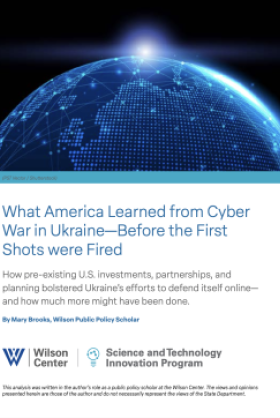Jackson-Vanik in Today's World
"Jackson-Vanik has become a bit of a political football whose lofty ideals at times have been dragged into more everyday trade disputes. Russia no doubt will "graduate" from Jackson-Vanik at some point in the future, most likely as part of its World Trade Organization accession process," according to Kennan Institute Deputy Director William E. Pomeranz.
The fact that the Jackson-Vanik Amendment still resonates today testifies to the eloquence of this landmark legislation. As two of its drafters—Richard Perle and Mark Talisman—informed the audience at the February 4 conference, the amendment was not solely designed with the Soviet Union in mind but applied to all "non-market economy" countries that denied the right of emigration to their people. As a result, the beneficiaries included not only Jewish refuseniks from the USSR, but also Hungarians, Romanians, and other citizens held captive by their respective countries.
Thus, we were reminded the Jackson-Vanik Amendment upholds a fundamental human right that remains as relevant today as during the Cold War. But, while the Amendment is broadly recognized as an iconic piece of legislation that should remain on the books, the conference raised the immediate question as to whether it still applies to Russia. After all, Russian citizens are now free to travel around the world, and regularly do so, while the U.S. government has recognized Russia as a "market economy," if only to subject Russia to U.S. anti-dumping legislation.
Jackson-Vanik has become a bit of a political football whose lofty ideals at times have been dragged into more everyday trade disputes. Russia no doubt will "graduate" from Jackson-Vanik at some point in the future, most likely as part of its World Trade Organization accession process. No matter how Jackson-Vanik is ultimately withdrawn, however, Russia still confronts many challenges on the human rights front. The Russian government increasingly has associated the human rights community with the political opposition, and several conference participants noted they were reverting to protest tactics eerily similar to those of the dissident movement.
At the same time, the conference revealed alternative approaches to the defense of human rights that did not exist during the Soviet period, such as the opportunity to appeal individual violations to the European Court of Human Rights. Another leading human rights activist even identified limited opportunities for cooperation with the Russian government on such problems as racism and xenophobia. The U.S. government will need to articulate a post-Jackson-Vanik policy that addresses the ever-changing human rights situation in Russia.
Related Program

Kennan Institute
The Kennan Institute is the premier US center for advanced research on Russia and Eurasia and the oldest and largest regional program at the Woodrow Wilson International Center for Scholars. The Kennan Institute is committed to improving American understanding of Russia, Ukraine, Central Asia, the Caucasus, and the surrounding region though research and exchange. Read more










